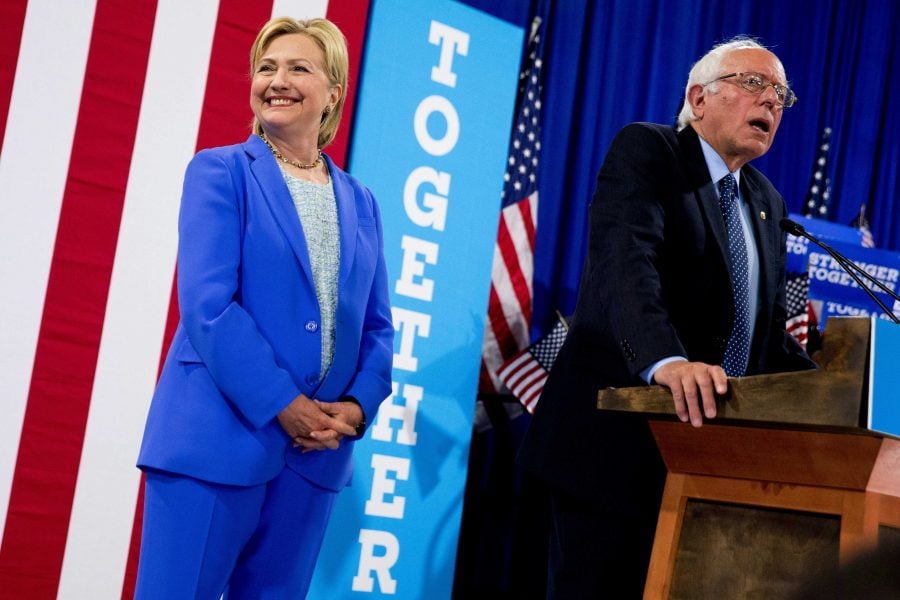Despite prior claims that he would continue campaigning through the Democratic National Convention (DNC), Sen. Bernie Sanders publicly endorsed Hillary Clinton June 12 during a Clinton rally in New Hampshire.
“Secretary Clinton has won the Democratic nominating process, and I congratulate her for that,” Sanders said. “She will be the Democratic nominee for president and I intend to do everything that I can to make certain she will be the next president of the United States.”
Sanders’s endorsement came more than a month after Clinton secured the delegates necessary to receive the Democratic nomination at the DNC and marked a major shift in the senator’s tone in discussing his former competitor. Instead of criticizing Clinton’s as a proponent for Washington and Wall Street’s elite, he acknowledged her as a populist candidate well-suited to defeat presumptive Republican nominee Donald Trump in the general election.
Following Sanders’s speech, Clinton thanked the senator for his support.
“Being here with him in New Hampshire, I can’t help but reflect how much more enjoyable this election is going to be now that we’re on the same side,” Clinton said. “Now, with your help, we are joining forces to defeat Donald Trump, win in November and together build a future we can all believe in.”
Responses to Clinton’s newest endorsement have been mixed — especially amongst Sanders’s most passionate supporters — with some disappointed in Sanders for accepting defeat before the DNC. But for many Americans, including DePaul alum Clint Miller and DePaul seniors Cedric Ngwa and Joey Molloy, Sanders’s endorsement was expected to happen eventually.
Although Molloy voted for Sanders in the Primary, he said he later regretted that decision.
“I’m a supporter of Bernie’s ideas,” Molloy said. “I think it’s important to have people like him out there deliver a message and move the country forward, but as a politician with a more realistic approach and ability to listen to different ideas I think Clinton is better suited for the office.”
Miller considered Sanders’s defeat and subsequent endorsement of Clinton as “part of the mathematical reality” of America’s two-party system.
“If Sanders decided to run as a third-party candidate or supporter another like Jill Stein, he could only hurt his own agenda,” Miller said.
However, Miller did mention his distaste for the two-party system that prevents Sanders from running himself or supporting Stein without inadvertently helping the Republican Party’s cause.
“The other part of my mind is sickened by (Sanders’s endorsement of Clinton), not because of anything wrong with Sanders but because this is just another example of the establishment candidate butting out competition because their opposition knows how the voting system works as well. We need a candidate willing to change the system so this type of dropout wouldn’t be encouraged and logical.”
Ngwa pointed out another potential issue with Sanders’s endorsement: the perception of him becoming a part of the very establishment his campaign set out to destroy.
“His endorsement will appear as though he is selling out in light of the recent Clinton scandals, and some of his supporters may choose to not vote,” Ngwa said. “I don’t believe that Sanders is selling out, rather he is looking at the grand scheme of things (to secure) the future of the U.S. by fortifying the Democratic Party against their foe, Trump.”
As for Sanders’ future participation in the Clinton campaign, Ngwa, Molloy and Miller all agreed his presence and involvement would be in the best interest of the Democratic Party.
“If Bernie hit the campaign trail with (Clinton) in the coming months as her hype man, getting people excited and tapping into the frustration he spoke to so well in the campaign, (she) would definitely benefic from it,” Molloy said.
Ngwa also noted the enthusiasm Sanders incites as a major benefit for Clinton going forward.
“Sanders should absolutely be involved in the campaign,” Ngwa said. “His campaign has had arguably the biggest influence on social media platforms and his ability to reach into the wants and needs of the youth can prove to be very beneficial.”
In response to claims Sanders’s endorsement speech was lacking enthusiasm, Miller stressed how the Sanders campaign has influenced Clinton campaign platforms.
“I think it’s also important to mention how Hillary has made major concessions since her race began, and now includes the minimum wage and free public education platform statements that Sanders wanted from the start,” Miller said. “When your former opposition is so much more in line with the issues, and because he has always made it clear that his campaign has been about the issues and not himself, then the decision (to endorse Clinton) and his enthusiasm are much more believable.”


